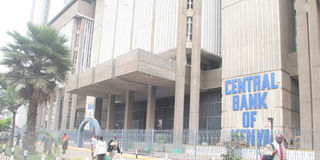Investors’ push for high returns on T-bills hurts State cash plan

PHOTO | FILE The Central Bank of Kenya. Investors are pushing to earn more from Treasury bills, putting the Government in a tight spot.
What you need to know:
- Rate on the 91-day paper rose by 1.89 per cent to 8.754 per cent last week from 6.863 per cent the previous week
Investors’ push for higher returns from Treasury bills is hurting government’s plan to raise funds through domestic borrowing.
Last week, the rates on Treasury bills – instruments that government use to borrow short-term funds from the market – rose for as much as 189 basis points as investors sought higher yields amid tightening liquidity situation.
The rate on the 91-day paper rose by 1.89 per cent to 8.754 per cent last week from 6.863 per cent a week earlier, even as investors kept off from lending money to the government.
The paper, from which the government was seeking to raise Sh3 billion to meet its short term budget needs, was 33 per cent subscribed, putting the government in a tight spot even as rates are poised to rise further.
The government raised Sh1 billion only from the paper.
Tight liquidity
In an interview, National Treasury Cabinet Secretary Henry Rotich said investors are now demanding for higher rates following tight liquidity in the market and the rise in inflation that is currently at 6 per cent.
In June, inflation rose to 4.91 per cent from 4.05 per cent in May.
“It is true the rates are going up, but these are market determined. Inflation has been going up and the market also expects rates to follow the same trend,” Mr Rotich said during an interview on Friday last week.
In the same week, the government sought to raise Sh3 billion each from the 182-day and 364-day Treasury bills, with both attracting bids worth Sh4.6 billion, with a shortfall standing at Sh1.4 billion.
“The rising yields on T-bills and poor appetite at recent auctions are likely to throw the government’s deficit funding plans into a quagmire unless the government injects some liquidity into money markets, an action which has the potential of pushing inflation higher,” said Contrarian Investing analyst Mika Davis in a research note last Saturday.
Interbank rates
The rate on the 364-day Treasury bill rose by 0.93 per cent to 10.88 per cent in the week under review, with the rate on the 182-day paper remaining largely flat, rising 0.079 per cent to 6.872 per cent.
The tight liquidity in the market also saw interbank rates rising by 1.4 per cent as at the end of July 31 to 8.54 per cent. The interbank volumes transacted, however, remained little changed, at an average of Sh18.2 billion compared with Sh18.7 billion recorded in the previous week.
“The tight liquidity is attributed to a build-up of Government deposits as Government finalises payment arrangements for the new ministries,” the Central Bank said in its weekly report.
Although Mr Rotich said the rates could rise further in the coming weeks, they are set to stabilise, especially as the government plans to float a sovereign bond later this year targeting to raise $1 billion (Sh85 billion) to fund infrastructure projects like the Lapsset project.
The government had set the target of collecting only Sh106 billion from the domestic market in this financial year, down from Sh119.5 billion in the 2012/13 financial year.
This followed the unveiling of the ambitious Sh1.6 trillion budget, with the budget deficit standing at Sh329 billion, with Sh106 billion set to be borrowed from the domestic market.
As at July 26, the gross government domestic debt stood at Sh104.6 trillion.




